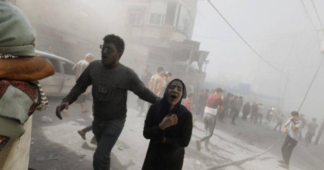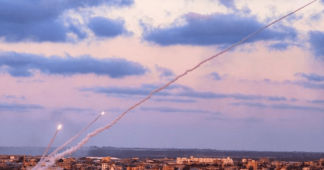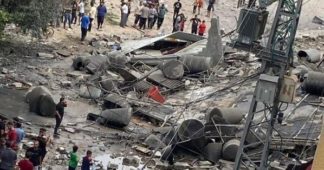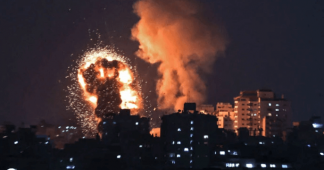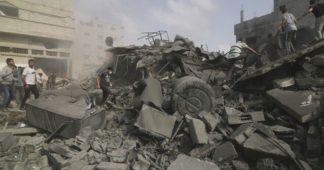All the signs are in place that Israel is once again seriously considering a massive ethnic cleansing operation, conducted at lightning speed and with US assistance
By Jonathan Cook
1 November 2023
As Israeli forces began making limited ground incursions into northern Gaza over the weekend, reports proliferated that Israel was readying plans to expel much or all of the enclave’s population into the neighbouring Egyptian territory of Sinai.
In part, those fears were fuelled by a report last week, published in the Israeli outlet Calcalist, of a leaked policy draft from the intelligence ministry outlining just such an ethnic cleansing plan for Gaza.
Further concerns were raised by a report in the Financial Times on Monday that Israel’s prime minister, Benjamin Netanyahu, had lobbied the European Union on the idea of driving the strip’s Palestinians into Sinai under cover of war.
Some EU members, including the Czech Republic and Austria, were said to have been receptive and floated the idea at a meeting of member states last week. An unnamed European diplomat told the FT: “Now is the time to put increased pressure on the Egyptians to agree.”
According to the leaked Israeli intelligence ministry document, after their expulsion, Gaza’s 2.3 million Palestinians would initially be housed in tent cities, before permanent communities could be built in the peninsula’s north.
A military “sterile zone”, several kilometres wide, would prevent any return to Gaza. Longer term, Israel would encourage other states – especially Canada, European countries such as Greece and Spain, and North African countries – to absorb the Palestinian population in Sinai.
The ministry reportedly believes the expulsion of Palestinians from Gaza into Sinai would be “liable to provide positive and long-lasting strategic results”.
For Palestinians, on the other hand, it has traumatic echoes of Israel’s mass expulsion of Palestinians from their homeland at Israel’s creation in 1948 – what Palestinians call their Nakba, or Catastrophe.
Ethnic cleansing plan
The leaked document was quickly dismissed as speculative. But, in fact, Israel has had just such an ethnic cleansing plan for Gaza on the drawing board, approved by the United States, since at least 2007. That was shortly after Hamas won Palestinian elections and took control of the enclave.
After a series of failed, secret diplomatic efforts over the past 16 years to arm-twist Egypt into accepting this so-called “peace plan” – known officially as the Greater Gaza Plan – Israel may be tempted to exploit the current moment to implement a much crueller version of it by force
That would certainly explain Israel’s current devastating bombing campaign in Gaza – which officials are positively comparing to the horrifying firebombing of civilians in the German city of Dresden in the Second World War – as well as Israel’s order to one million Palestinians to ethnically cleanse themselves from northern Gaza.
On Sunday, Israel bombed buildings all around al-Quds hospital in northern Gaza, filling wards with clouds of toxic dust. Administrators received repeated warnings that the hospital had to be evacuated immediately. Staff said that was impossible because too many patients were far too sick to be moved.
The concentration of Palestinians into southern Gaza – where they are also being bombed and deprived of power, food, water and communications, with hospitals and aid compounds unable to function – has created an unprecedented humanitarian catastrophe.
The pressure is building day by day on Egypt’s military ruler Abdel Fattah el-Sisi to open the Rafah crossing on humanitarian grounds and let Palestinians flood into Sinai.
Hamas’ attack on Israeli communities next to Gaza on 7 October may have provided precisely the pretext Israel needs to dust off its ethnic cleansing plan.
With Washington and Europe on board, and the western media still focused primarily on Israel’s trauma rather than Gaza’s, Netanyahu cannot wait too long before his window for action closes.
Pressure on Egypt
The Greater Gaza Plan first came to light in 2014, after leaks to Israeli and Egyptian media – apparently part of a pressure campaign on Sisi, then recently installed with US backing. The Egyptian military had overthrown an elected Muslim Brotherhood government the previous year.
Palestinian President Mahmoud Abbas confirmed the plan’s existence at that time by insisting he had quashed it. He told an interviewer that it had been “unfortunately accepted by some here [in Egypt]. Don’t ask me more about that. We abolished it, because it can’t be.”
Middle East Eye was one of the very few western media outlets to report on these developments at the time.
As concern grew among Egyptians and Palestinians, a former aide to Hosni Mubarak, who ruled Egypt until 2011, came forward to state that the administration of George W Bush had pressured Mubarak to accept the plan as far back as 2007.
The next president, Mohamed Morsi, of the Muslim Brotherhood, was also reportedly leaned on in a similar manner in 2012.
The source quoted Mubarak as saying in response to the plan: “We are fighting both the US and Israel. There is pressure on us to open the Rafah crossing for the Palestinians and grant them freedom of residence, particularly in Sinai. In a year or two, the issue of Palestinian refugee camps in Sinai will be internationalised.”
At that time, pushing Palestinians into Sinai was dressed up as a “peace plan”. Now, should Israel succeed, it will be the endgame in a violent ethnic cleansing operation.
As MEE noted back in 2014, the Greater Gaza Plan envisioned transferring 1,600 sq km of Sinai – five times the size of Gaza – to the Palestinian leadership in the West Bank, headed by Abbas.
“The territory in Sinai would become a demilitarised Palestinian state – dubbed ‘Greater Gaza’ – to which returning Palestinian refugees would be assigned… In return, Abbas would have to give up the right to a state in the West Bank and East Jerusalem.”
The hope was that Abbas would agree to rule a mini Palestinian state in Sinai, where most Palestinian refugees in the region could be settled, stripping them of their right of return under international law.
Most Palestinians in Gaza are refugees, or descended from refugees, from Israel’s ethnic cleansing operations of 1948.
Israeli right’s dream
The idea of creating a Palestinian state outside historic Palestine – in either Jordan or Sinai – has a long pedigree in Zionist thinking. “Jordan is Palestine” has been a rallying cry on the Israeli right for decades. There have been parallel suggestions for Sinai.
The scheme became the centrepiece of the 2004 Herzliya conference, an annual meeting of Israel’s political, academic and security elites to exchange and develop policy ideas. It was enthusiastically adopted by Uzi Arad, the conference’s
A variation of the “Sinai is Palestine” option was revived by the right during Operation Protective Edge, Israel’s 50-day attack on Gaza in the summer of 2014.
Moshe Feiglin, the speaker of the Israeli Knesset and then a member of Netanyahu’s Likud party, called for Gaza’s inhabitants to be expelled from their homes under cover of the operation and moved into Sinai, in what he termed a “solution for Gaza”.
The Greater Gaza Plan received a further shot in the arm in 2018 from the Trump administration, when reports suggested it was considered for inclusion in the US president’s “deal of the century” plan to bring about normalisation between Israel and the Arab world.
Israel’s rationale for the Sinai option between 2007 and 2018 was that it undermined Abbas’ campaign at the United Nations to seek recognition of Palestinian statehood.
Notably, Israel’s large-scale military attacks on Gaza – in the winter of 2008, 2012 and again in 2014 – coincided with reported Israeli and US efforts to turn the screws on successive Egyptian leaders to concede parts of Sinai.
Destruction of Gaza, intensifying the humanitarian catastrophe there, seems to have been part of that pressure campaign.
‘No human can exist’
All of that is the context for interpreting Israel’s unprecedented current rampage through Gaza, as well as the similarly unprecedented fallout from political and military crises in Israel caused by Hamas’ 7 October attack.
The Greater Gaza Plan was originally intended to provide the Palestinian leadership with a sweetener, offering some kind of state – though not in historic Palestine. Sinai would host new Palestinian cities, a free-trade zone, a power plant, and a seaport and airport.
The main sticking point for Egypt – apart from being seen to collude with Israel in erasing the Palestinian national cause – was concern that Hamas would gain a base inside Egypt, and strengthen Egypt’s home-grown Islamist movements.
There are plenty of indications that Israel’s determination to drive Palestinians into Egypt has intensified since the 7 October attack, and that the Hamas breakout has provided an opportunity to achieve by force what could not be achieved through diplomacy.
Israeli leaders now sound in no mood to take account of Egyptian concerns.
A week into its military operations, a spokesman for the Israeli military, Amir Avivi, told the BBC that Israel could not ensure the safety of civilians in Gaza. He added: “They need to move south, out to the Sinai Peninsula.”
The next day, a former Israeli ambassador to the US, Danny Ayalon, a Netanyahu confidant, amplified the point: “There is almost endless space in the Sinai Desert… This is not the first time it has been done… We and the international community will prepare the infrastructure for tent cities.”
He concluded: “Egypt will have to play ball.”
These officials have presented this as a temporary move during Israel’s bombing campaign and ground invasion. But all the signs are that Israel has far larger ambitions.
Benny Gantz, a former general who now sits in a unity government with Netanyahu, has said Israel has a plan to “change the security and strategic reality in the region”.
Giora Eiland, a former national security adviser, has said the goal is to “create conditions where life in Gaza becomes unsustainable”. As a result, “Gaza will become a place where no human being can exist.”
Spiralling out of control
Sisi is more than aware of the pressure Israel is bringing to bear on Egypt. At a press conference on 18 October, he warned that Israel’s bombing of Gaza was creating a humanitarian crisis that “could spiral out of control”.
He added: “What is happening now in Gaza is an attempt to force civilian residents to take refuge and migrate to Egypt, which should not be accepted.”
The scenario Sisi fears is a repeat of events in 2008 when hundreds of thousands of Palestinians broke through the barrier between Gaza and Sinai to get food and fuel because of Israel’s siege of the enclave. To prevent a recurrence, Egypt has repeatedly bolstered security measures along its short border with Gaza.
Nonetheless, Cairo reportedly has made preparations for just such a development. Its plans include the rapid setting up of tent cities next to the Sinai towns of Sheikh Zuwayed and Rafah.
Sisi said that, if Palestinians were driven into Sinai, Egyptians would “go out and protest in their millions”.
Cairo’s concerns about Israeli intentions are shared by United Nations’ official Francesca Albanese, a special rapporteur on the occupied territories.
Referring to Israel’s two main historic ethnic cleansing operations, she observed: “There is a grave danger that what we are witnessing may be a repeat of the 1948 Nakba, and the 1967 Naksa, yet on a larger scale. The international community must do everything to stop this from happening again.”
The US, which has long backed the Greater Gaza Plan, has its own forms of leverage – including financial pressure – to encourage Sisi to comply.
Egypt is mired in an unprecedented debt crisis of more than $160bn, plus spiralling inflation, as Sisi heads into a presidential election.
Egyptian officials reportedly believe Washington will try to use a debt write-off as an incentive to accept refugees from a renewed Israeli ethnic cleansing operation.
Only three days after the Hamas attack, Biden administration officials publicly declared that they had made arrangements with unnamed third countries to offer safe passage out of Gaza for Palestinian civilians.
All the signs are in place that Israel is once again seriously considering a massive ethnic cleansing operation, conducted at lightning speed and with US assistance, to override international objections.
The question is, is anyone ready, or able, to stop them?
We remind our readers that publication of articles on our site does not mean that we agree with what is written. Our policy is to publish anything which we consider of interest, so as to assist our readers in forming their opinions. Sometimes we even publish articles with which we totally disagree, since we believe it is important for our readers to be informed on as wide a spectrum of views as possible.
